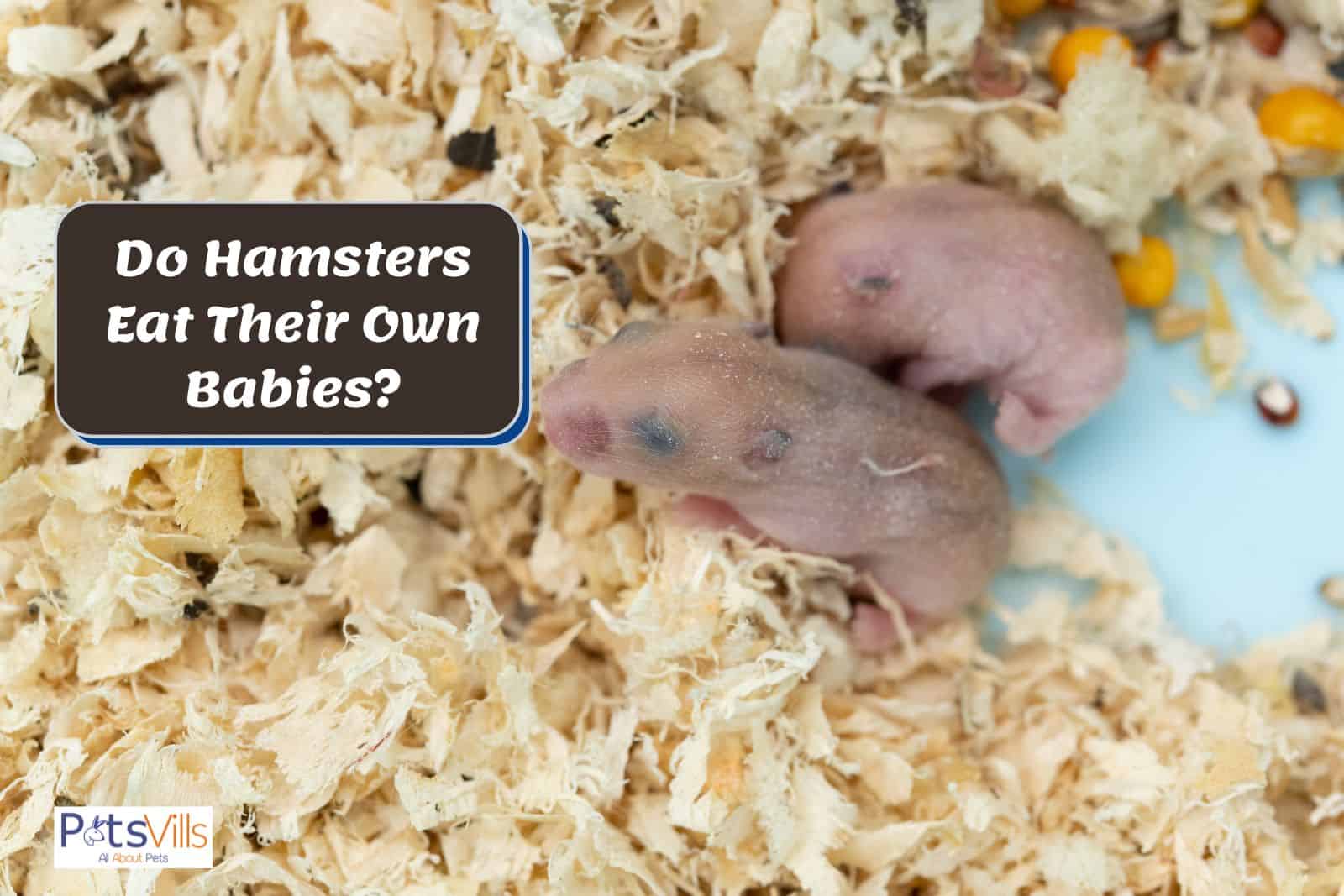Every pet owner with a pregnant hammy has asked themselves, do hamsters eat their own babies?
According to experts, it’s common for hamsters to eat their babies. It results from stress, babies having a strange smell, the baby having an illness, or numerous other factors (1).
In this article, I’ll further discuss all the typical reasons, how to prevent it, and some guidelines about caring for mother hamsters.
Table of Contents
Key Takeaways
- Hamsters will eat their babies under a variety of scenarios. Some examples include being overwhelmed by stress, lacking proper food, and improper habitat conditions.
- Owners can prevent hamsters from eating their babies. It only requires closely monitoring the mother, feeding them properly, and providing a quiet/safe environment.
- Never undertake caring for a pregnant hamster without knowing the basics. You must know the signs of pregnancy, regular birthing/nursing schedules, and diet requirements.
What Causes a Hamster to Eat Their Babies?
Several animals eat their babies, including polar bears, sloth bears, cats, rats, lions, and obviously hamsters.
So we’ve now established that it’s normal for pet hamsters to eat their babies. But it’s not enough to only know about it when trying to prevent it.
You’ll need to know what’s causing the cannibalism to occur. Therefore, let’s start by taking a detailed look at all the common reasons for this behavior:
1. Stress Overwhelms the Mother Hamster
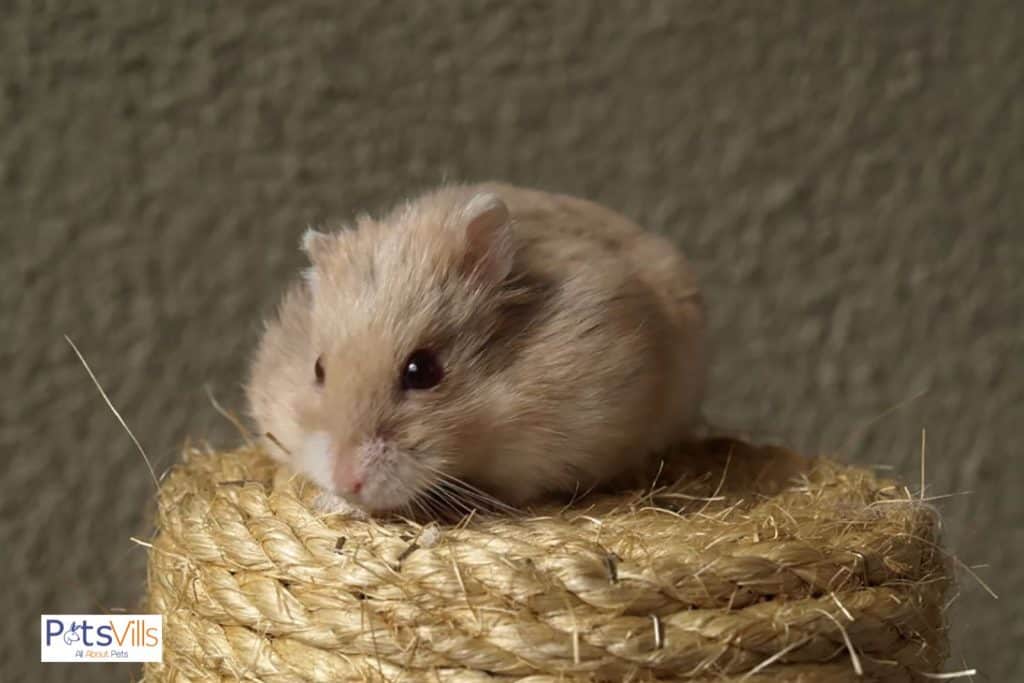
Stress is one of the primary reasons for hamsters eating their young. If a mother hamster feels overwhelmed, she could eat their babies.
Some stressors include being handled too much or “threatening noises” near their habitat (2). Sometimes, a hamster might become overwhelmed by its owner’s excitement.
Owners need to be careful about how they act on a pregnant hamster. Otherwise, their behavior could cause the mother hamster to act differently.
I also must warn owners about first-time mother hamsters. These female hamsters are known for being very susceptible to stress, so they’re more likely to eat their babies.
Check out this detailed guide on hamster stress signs.
2. The Babies Have a Strange Smell
Hamsters are known to rely on smell more than any of their other senses. This is because it’s their most powerful sense, and they use it to identify other hammies.
As a result, mother hamsters will pick up on their babies’ smell. So they can recognize them without much difficulty inside their cages.
But a baby’s scent can change from various encounters. For instance, if I want to hold one of the babies or move it, my scent would now be on the baby.
The mother hamster won’t react well to this change in scent. She’ll no longer be able to tell if the hamster is hers.
So she’s left with one option, eating it to remove this confusion from her life. The mother may feel like this unknown entity is now a threat to the other babies.
It’s another reason owners must be extra careful with pregnant hamsters. A small mistake around the babies can result in a disaster.
Check out this detailed guide on are hamsters smelly.
3. Health Issues
Some hamster babies pick up health issues or physical conditions (3). The mother will recognize these issues and reject these pups as she knows they won’t survive.
She’ll do one of two things: eat them immediately or wait for them to die and then eat them. It’s a cruel way of dealing with these issues, but the only way she can keep the other babies safe.
Check out this video for more information about taking care of rejected babies.
4. Lack of Enough Food for Mother Hamster
Mother hamsters need a proper hamster diet to offer enough nutrients for their pups. She’ll eat the pups to gain the necessary nutrients if she doesn’t get them.
In her eyes, it kills two birds with one stone. First, she solves the lack of food while reducing the number of babies to feed.
You can easily provide food by adding food to the food bowls but avoid touching the mother or the babies.
I’ll discuss how the diet needs to change in the “What to Know About Caring for Mother Hamsters” section.
5. Fear of Predators
Hamsters don’t have many defense mechanisms to protect themselves. Due to this, they often are highly aware of the animals, specifically predators, around them (4).
So let’s say your dog gets too close to the nursing area. The mother hamster may get fearful your dog intends to eat her babies.
In response, she would instead get the baby’s nutrients for herself. So it ends up with her eating the baby or the entire litter before your dog, or another predator can beat her to it.
6. Poor Habitat Conditions and Overpopulation
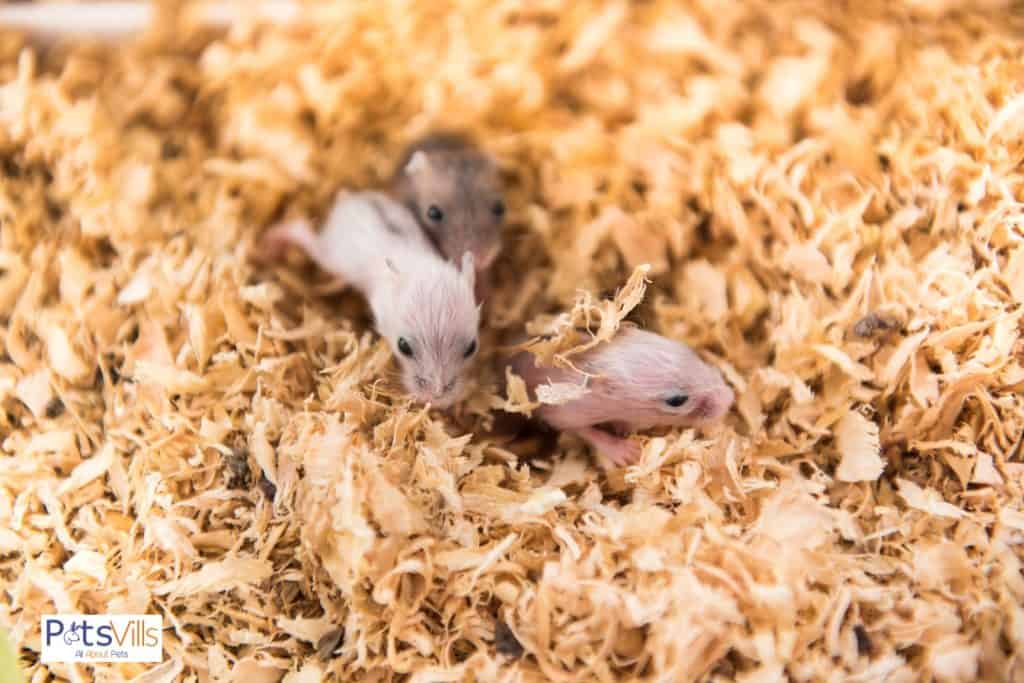
Habitats can have a massive impact on a hamster’s well-being. It becomes even more essential when caring for a mother and her pups.
Always ensure the hamster cage is clean and dry. It’s best if there are no wet patches and checks that the water bottle is not leaking.
Hamsters also need a comfortable nest. You can provide this by lining the cage with cage substrate, paper towels, and unscented tissue paper.
After all, both need a significant amount of room for this process to go smoothly. The mama hamster who doesn’t feel there’s enough space for the litter size will address the situation herself.
She might even feel overwhelmed enough to eat all the babies. It’s just a situation anyone wants to be involved with, whether it’s the mom, owner, or babies.
Similarly, hamsters who feel their litter is too giant will also thin the herd. It’s a response to feeling unfit to handle and care for them.
7. Baby Dies Accidentally
Accidents do happen even in the animal kingdom. For instance, a mother may kill her baby hamsters by mistake when moving or accidentally suffocate them in her pouch.
Either way, she’ll eat it to get those nutrients and keep the nesting area clean. It’s a maneuver to help ensure she can take care of the rest more effectively.
Now, is there anything one can do to stop their hammy from eating healthy offspring?
How to Stop Hamsters From Eating their Own Babies?
Hamster owners aren’t helpless when it comes to filial cannibalism. There are several actions to take that can prevent this tragedy:
- Create a safe and calm nesting space: Keeping a hamster mother happy reduces their stress and keeps them calm. You can accomplish it relatively easily by creating a safe, quiet nursing area away from all outside noise.
- Never touch the babies: Many owners make the mistake of handling hamster babies. It must be avoided at all costs unless necessary. If needed, put on gloves and move them rather than doing it with your bare hands.
- Constantly monitor the mother’s behavior: Constant monitoring of the mother’s behavior can go a long way to preventing them from eating babies. You can then intervene when a worrisome behavior presents itself, like pup rejection.
- Offer ample food for the mother hamster: Providing hamster moms with plenty of food is crucial to a successful nursing period.
- Keep the babies and mother separate from other hamsters: Multiple hamster owners will need to put the mommy hamster and her pups in a separate cage. If you don’t, the other hamsters could become aggressive and cause the mother stress.
As a hammy parent, you should be prepared before the pups come. So what should you know about hamster pregnancy?
3 Helpful Tips About Hamsters Pregnancy
Hamster owners shouldn’t go into a situation without knowing the basics. So I thought it’d be wise to discuss the fundamentals of caring for a mother hamster:
1. Signs of a Pregnant Hamster
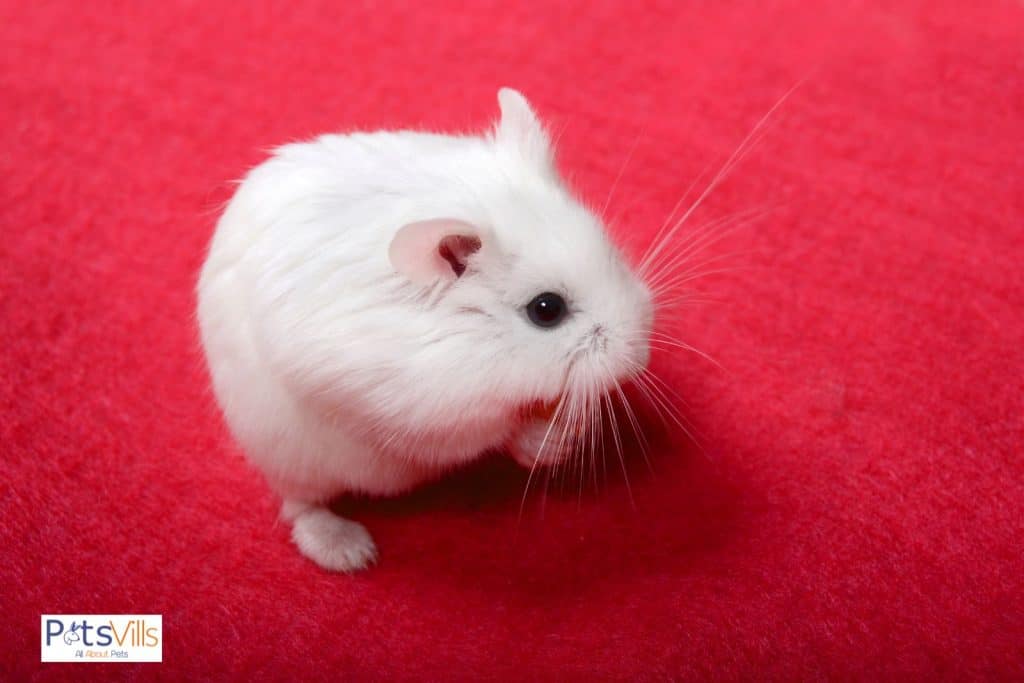
You can’t care for a mother hamster without knowing how to tell when one’s pregnant. So it’s vital to understand the various signs of a pregnant hamster.
I must note that female hamsters can get pregnant once a month. It’s why litters are typical for owners who house multiple hamsters of opposite genders together.
Therefore, someone who doesn’t want a litter of hamster pups should be careful. I always keep mine separated to ensure I never have to deal with this situation.
As for the signs, pregnant hamsters often display slight changes to their personality. For example, a more social hamster may become more reclusive when pregnant.
But the most obvious sign is a growing abdomen. It’ll usually present itself a few days before the litter is born.
Once this happens, your hamster will likely become restless and frantic. You’ll then want to provide them with nesting material when the birth begins.
2. Diet for Pregnant and Mother Hamsters
Hamster mothers will need more food during both the pregnancy and nursing periods. The diet won’t change, but you’ll have to provide more.
Otherwise, the hamster will look for other ways to get those necessary nutrients. So it’s essential to provide them with the right amount of food and keep them happy.
You’ll also want to ensure fresh water is always available. After all, they’ll need a steady source of fluids as taking care of babies is hard work.
3. Normal Birthing and Nursing Schedule
Before giving birth, the hamster will begin to build a nest. It’ll consist of various materials inside their cages, such as substrate and tissues.
You’ll often find food hidden in the nest or right outside of it. These behaviors are classic indicators that the babies are coming soon.
After birth, the mother will nurse her babies for two to three weeks. You’ll then need to switch the babies onto a regular diet for a captive hamster.
FAQs
What happens when you touch a hamster’s baby?
If you touch a hamster’s babies, your scent will rub off on them and cause their mother not to recognize them. It puts them at serious risk of being rejected and eaten.
Should you separate the father hamster from the mother hamster?
Yes, It’s advisable to separate female hamsters from male hamsters to avoid too much breeding.
Conclusion
So do hamsters eat their own babies? Yes, a hamster will eat their young when stressed, senses something is wrong with the baby, or isn’t getting enough nutrients.
But you’ve now learned to minimize it with our various tips. Therefore, you should have a good handle on how to avoid this issue as much as possible.
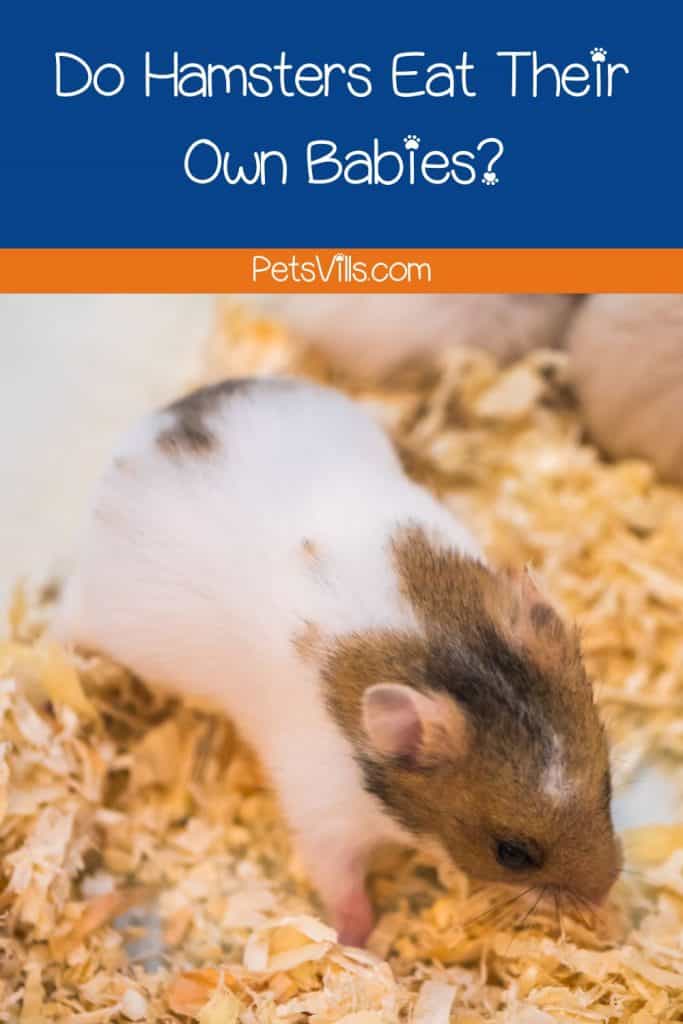
So, did you ever see hamster eating their own babies? Don’t forget to share with us in the comments section!
Resources
- 1. Chelini MOM, Palme R, Otta E. Social stress and reproductive success in the female Syrian hamster: Endocrine and behavioral correlates. Physiology & Behavior. 2011;104(5):948-954. doi:10.1016/j.physbeh.2011.06.006
- 2. Health and welfare | rspca.org.uk. Rspca.org.uk. Published 2017. https://www.rspca.org.uk/adviceandwelfare/pets/rodents/hamsters/health
- 3. Disorders and Diseases of Hamsters – All Other Pets. Merck Veterinary Manual. https://www.merckvetmanual.com/all-other-pets/hamsters/disorders-and-diseases-of-hamsters
- 4. Poor A. Cricetinae (hamsters). Animal Diversity Web. https://animaldiversity.org/accounts/Cricetinae/#:~:text=Species%20that%20are%20known%20to

My name is Ben Roberts, and I absolutely love animals. So, naturally, I love writing about them too! As far as my animals, I have a Pit-bull, a Beagle-lab mix, a Chihuahua, and one old cat. Each one of them provides me with a new adventure every day. And the best part is they’re all best friends. Well, except the cat when he gets a little annoyed.
FIND HIM ON: FACEBOOK and TWITTER.
Read his latest ARTICLES
Learn more about Benhere

